
Roxette are a Swedish pop rock group, formerly consisting of Marie Fredriksson and Per Gessle. They are Sweden's second-best-selling music act after ABBA.

Joyride is the third studio album by Swedish pop rock duo Roxette, released on 25 March 1991 by EMI as the follow-up to their international breakthrough Look Sharp! (1988), as well as the non-album single "It Must Have Been Love", from the soundtrack to Pretty Woman (1990). The album was recorded over an 11-month period in Sweden. The duo experienced considerable pressure from their record label to deliver a successful follow-up album, and resisted pressure to relocate to Los Angeles and work with experienced American producers.
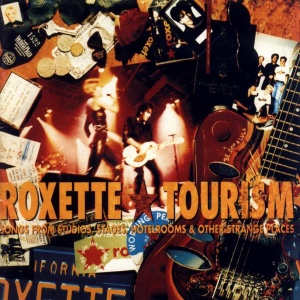
Tourism: Songs from Studios, Stages, Hotelrooms & Other Strange Places is the fourth studio album by Swedish pop duo Roxette, released on 28 August 1992 by EMI. Despite often being mistaken for a live album, the record was described by Roxette in its liner notes as a "tour album": the band recorded the majority of its material in numerous recording studios in between live dates of their worldwide Join the Joyride! Tour. The album contains three live concert recordings, while another track was recorded live in an empty nightclub in São Paulo. A further two songs were recorded in Buenos Aires' Alvear Palace Hotel.

"It Must Have Been Love", originally "It Must Have Been Love (Christmas for the Broken Hearted)", is a song written by Per Gessle and performed by the Swedish pop duo Roxette. The power ballad became the duo's third number one hit in the United States, and is one of their best selling releases, being certified gold or platinum in a number of countries.

"Sleeping in My Car" is a song by Swedish pop music duo Roxette, released on 7 March 1994 by EMI as the lead single from the duo's fifth studio album, Crash! Boom! Bang! (1994). The song was composed by Per Gessle in under an hour, and was the final song the band recorded for the album. It is a pop rock song containing elements drawn from pop punk. Marie Fredriksson's vocal range on the track spans over three octaves. The band performed the song at the inaugural 1994 MTV Europe Music Awards.

"Listen to Your Heart" is a song by Swedish rock duo Roxette, which was originally released in Sweden in September 1988 as the second single from the duo's second studio album, Look Sharp! (1988). It was written by Per Gessle with former Gyllene Tider guitarist Mats "M.P." Persson. The song went on to become one of the most successful singles of 1989, reaching number one in both the United States and Canada around November 1989. The track was the first song to reach number one in the US without a commercially released 7-inch single.

"Dangerous" is a song by Swedish pop duo Roxette. Written by Per Gessle, the song was released as the fourth and final single from their second studio album, Look Sharp! (1988). Gessle penned it just before Roxette's first tour in 1987. Released in May 1989, it was the group's third top-10 single on the US Billboard Hot 100, reaching number two. It also entered the top 10 in Australia, Canada, and six European countries. The music video was recorded in the ruins of Borgholm Castle. In the UK and Ireland, "Dangerous" was released as a double A-side with "Listen to Your Heart".

"The Look" is a song by Swedish pop duo Roxette. It was released in early 1989 as the fourth single from their second studio album, Look Sharp! (1988). It became an international hit, and was one of the most successful singles of 1989. It topped the charts in 25 countries, and was the first of their four number ones on the Billboard Hot 100. The song received mostly positive reviews from music critics.

"Fading Like a Flower (Every Time You Leave)" is a power ballad by Swedish pop duo Roxette from their third studio album, Joyride (1991). Written by Per Gessle and produced by Clarence Öfwerman, the song was released as the second single from Joyride on 29 April 1991, by EMI Records. It became the duo's fifth consecutive Top 10 hit single in the United States, peaking at No. 2 on the Billboard Hot 100. The single reached the Top 10 in an additional 12 countries.

"How Do You Do!" is a pop rock song by Swedish pop duo Roxette. It was released as the lead single from their fourth studio album Tourism on 3 July 1992. The track was a commercial success upon release, topping the Norwegian Singles Chart and peaking at number two in several countries, including Austria, Belgium, Finland, Germany, the Netherlands, Sweden and Switzerland. The single was backed by several remixes created by Swedish production duo BomKrash, which consisted of Jacob Hellner and Carl-Michael Herlöfsson.

"Crash! Boom! Bang!" is a song by Swedish pop music duo Roxette, released in May 1994 by EMI as the second single from the duo's fifth studio album, Crash! Boom! Bang! (1994). The song became a moderate hit in several European countries, peaking in the top 20 in Austria, Belgium, Finland and Sweden. It spent over five months on the German Singles Chart, peaking at number 31. The accompanying music video for the song, directed by Michael Geoghegan, had to be filmed twice before release, due to technical issues.
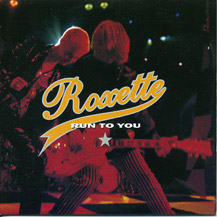
"Run to You" is a song by Swedish pop music duo Roxette, released on 21 November 1994 by EMI as the fourth single from the duo's fifth studio album, Crash! Boom! Bang! (1994). Written by Per Gessle and produced by Clarence Öfwerman, the song charted moderately in several territories, peaking at number 20 in Finland, while reaching the top forty in Belgium, Scotland, Switzerland and the UK. "Run to You" was the duo's final single to chart in the top fifty of the Australian Singles Chart, peaking at number 49. The song's music video was directed by Jonas Åkerlund.

"Almost Unreal" is a song by Swedish pop music duo Roxette, released on 10 May 1993 by EMI Records as the lead single from the soundtrack of the 1993 live action film Super Mario Bros., which starred Bob Hoskins, John Leguizamo, Dennis Hopper, and Samantha Mathis. The song became a top-20 hit in numerous territories, including Scandinavia, Ireland and the UK. It would also be the duo's final top ten hit in the latter two countries, excluding a re-release of "It Must Have Been Love" two months later. The song proved to be unsuccessful in North America, peaking at numbers 94 and 88 on the US Billboard Hot 100 and Cash Box Top 100, although it performed better in Canada, where it peaked within the top 30. It appeared as a bonus track on the Japanese edition of their next studio album, Crash! Boom! Bang! (1994), mistitled "It's Almost Unreal". The accompanying music video for "Almost Unreal" was directed by Michael Geoghegan.

"Vulnerable" is a song by Swedish pop music duo Roxette, released in February 1995 by EMI as the fifth and final single from their fifth studio album, Crash! Boom! Bang! (1994), while simultaneously acting as the lead single from the duo's 1995 compilation album, Rarities.

"The Big L." is a song by Swedish pop duo Roxette. Written by Per Gessle, it was released on 26 August 1991 by EMI as the third single from their third studio album, Joyride (1991). The song became a top ten hit in Belgium, Ireland and Sweden, and was the highest-charting single released from Joyride in France. It also reached the top twenty in a number of other countries, including Australia, Austria, Finland, Germany, the Netherlands, Spain and Switzerland. Despite a US radio mix of the song appearing on CD versions of the single, it was never released as a single in North America.
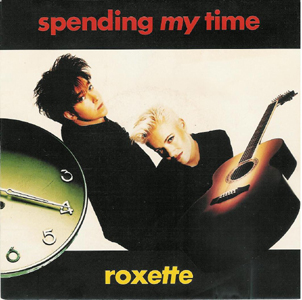
"Spending My Time" is a song by Swedish duo Roxette, released as the fourth single from their third studio album, Joyride (1991). It was written by Per Gessle and Mats Persson, and produced by Clarence Öfwerman. The single attained moderate success, reaching the top ten in Germany and Italy, and the top twenty in Australia, Austria, Belgium, Canada, Finland, Sweden and Switzerland, while peaking at number twenty-two on the UK Singles Chart and thirty-two on the Billboard Hot 100 in the United States. Its music video was directed by Wayne Isham.
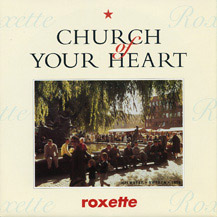
"Church of Your Heart" is the fifth and final single taken from Swedish pop duo Roxette's third studio album, Joyride (1991). Written by Per Gessle, the song was a top-20 hit in Canada, where it peaked at number 11, and charted throughout Europe, entering the top 40 in several countries. "I Call Your Name" – originally released as a single from their 1986 debut album Pearls of Passion – appeared as the B-side. On UK editions of the single, the song was backed by an exclusive megamix consisting of a medley of "It Must Have Been Love", "Listen to Your Heart", "The Look", "Joyride" and "Fading Like a Flower ".
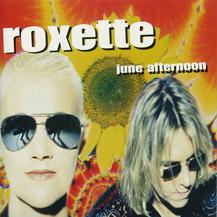
"June Afternoon" is a song by Swedish pop music duo Roxette, released in January 1996 as the second single from their second greatest hits compilation album, Don't Bore Us, Get to the Chorus! Roxette's Greatest Hits (1995). The single was only released in Europe, Australia, and Canada, peaking at number one in the Czech Republic and within the top 40 in numerous territories. Its accompanying music video was directed by Jonas Åkerlund.

"The Centre of the Heart" is a song by Swedish pop music duo Roxette, released on 19 March 2001 as the lead single from their seventh studio album, Room Service. An uptempo pop song, it was written by Per Gessle and originally demoed in January 1998 during sessions for their previous album Have a Nice Day (1999). The single was backed by an exclusive B-side, "Entering Your Heart", along with several remixes by StoneBridge.

The discography of Swedish pop duo Roxette consists of ten studio albums, one live album, thirteen compilation albums, one remix album, eleven video albums, three box sets, fifty-six singles and twenty promotional singles, as well as fifty-two music videos. The duo, which consisted of Per Gessle and Marie Fredriksson, are the second most commercially successful Swedish act of all time, after ABBA. They sold over 75 million records worldwide, although a report by the Los Angeles Times put the figure as high as 80 million. The RIAA awarded them certifications of 3.5 million units in the US, where the duo have sold over two million albums since Nielsen SoundScan began tracking sales data in May 1991. The BPI in the UK certified Roxette for shipments of at least 3 million. They were particularly successful in Germany, where they are recognised as one of the highest-certified acts of all time, with shipments of 5.725 million units.



















